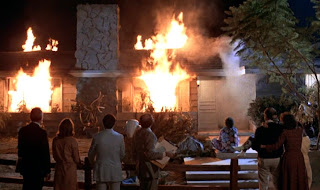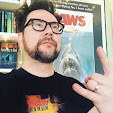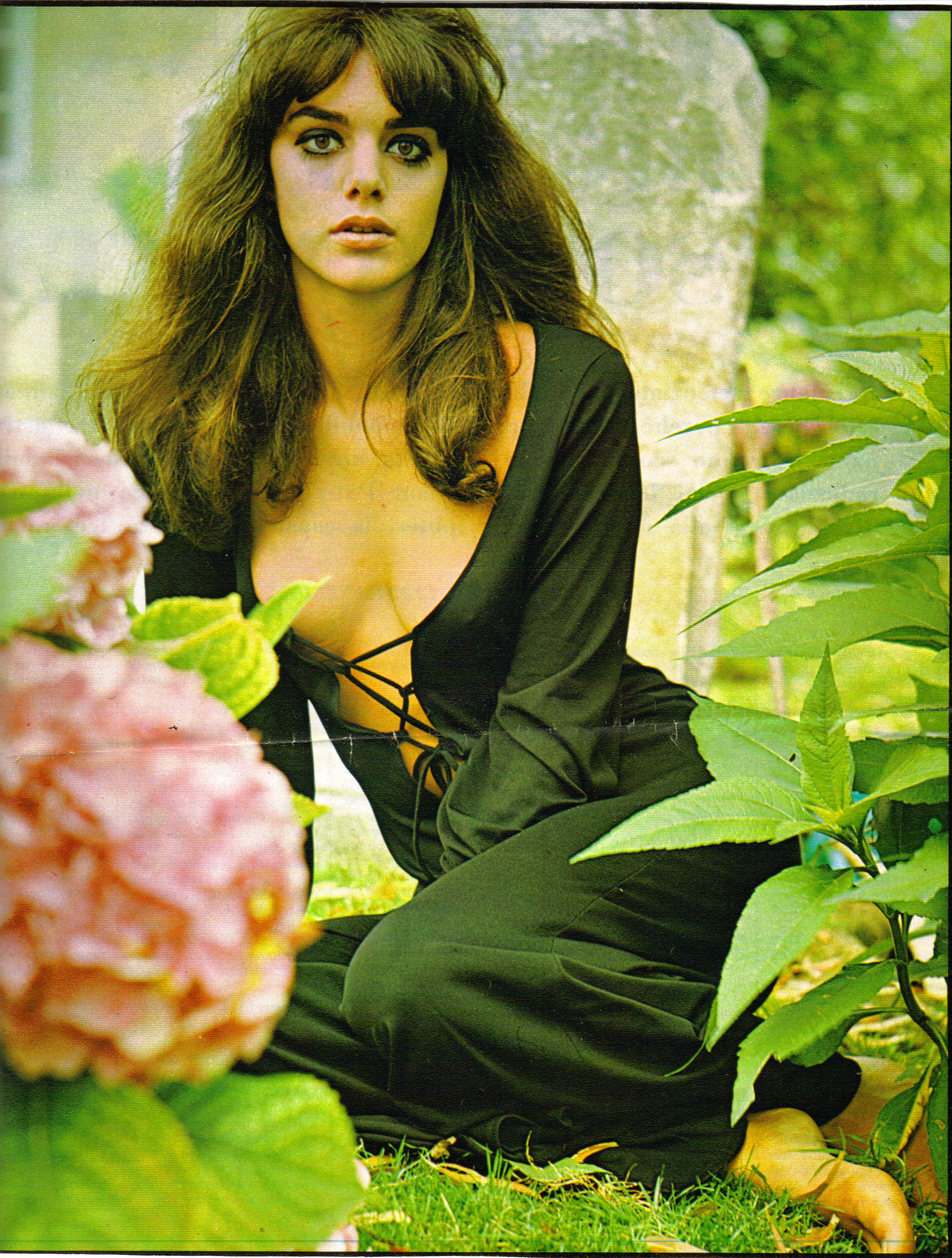 Terrence Malick
Terrence Malick is a unique and somewhat frustrating figure in contemporary film. In the years since
Badlands, his 1973 debut, he's made only three movies:
Days of Heaven (1978),
The Thin Red Line (1998), and
The New World (2005). Highly regarded for his widescreen, naturalistic compositions, Malick maintains a private life unusual for one of the most lauded types of modern artist, the film director. His background as a young philosophy professor, news magazine journalist, and uncredited scriptwriter for Jack Nicholson and Clint Eastwood has had great impact on his modest output.
Badlands is violent, poetic, ironic and weirdly romantic, and as confident, revelatory and exciting a film debut as has ever been made.

An impossibly young-looking
Martin Sheen (and his amazing hair) and a willowy and winsome Sissy Spacek play Kit and Holly, two aimless, and indeed amoral, heartland American kids who kill a lot of innocent people. When Kit sees her twirling her baton in her front yard, it's a textbook example of what will come to be called "meet cute" but it will not end that way. The estimable Warren Oates plays Spacek's widower father and soon he will of course forbid Kit to see his daughter any longer. We all know this story, we know its moves and its parries, but we have never seen it quite like this before.
What's more romantic than teenagers on the run? The trouble they can get into is more desirable than the slow death they see at home. That's why Holly doesn't escape when she has the chance: "It was better to spend a week with one who loved me for what I was than years of loneliness." What does Kit have to say if his plans to hit the road with Holly are cut short by the law? "I can't deny we've had fun though. And that's more'n I can say for some." Yeah, get your kicks on Route 66, huh, kid?



The 1950s
real-life crimes that inspired the movie, those of Charles Starkweather and Caril Ann Fugate, seem to epitomize the shadow of juvenile delinquency that was blamed on rock'n'roll, comic books, and rebel movies of the era. "You know who that sumbitch looks like? You know, don't you?" says one cop to another after Kit's capture (surely that can't be a spoiler!). "I'll kiss your ass if he don't look like James Dean." Cut to Sheen, smiling, satisfied, vindicated.
I think Starkweather was a harbinger of social misfits who would look to pop culture to fill in for their missing personalities; in that way he prefigured the modern era, whether one was a sociopath or not.


Starkweather himself may have never struck the above pose but it's still an insightful piece of myth-making that doubles on itself: a movie about a man who modeled himself after the movies. Martin Sheen as Charles Starkweather aping James Dean as Jett Rink in
Giant (1956). And, again, we all know what happened to James Dean. And Charlie Starkweather. The myth, and the reality, is a foregone conclusion. That's why we love it.
So death features blandly in the lovers' everyday lives long before they flee. Kit bets his garbageman coworker a dollar that he won't eat a dead dog someone has thrown out with their trash; Holly tosses her pet catfish, gasping and twitching, into the backyard watermelon patch without a backward glance because she thinks it's sick. After getting a job in a dairy farm, Kit regards a dead cow with disaffected curiosity. Holly's father kills her dog as punishment for disobeying him when she sees Kit again.



The first human death is the obvious one: Holly's father. Gutshot while standing in the living room of his modest country home seems a particular humiliation; Holly runs to him, touches his face as he blinks tenderly, and she asks, "Daddy, are you gonna be okay?" Holly is still a child. And like children, they go and live in a treehouse like Robinson Crusoe or perhaps the Lost Boys of
Peter Pan, far from the gaze of parents, police and other authority figures. He wants his alias to be James and hers, Priscilla (natch). They dance coolly to "
Love is Strange" and rig deadly booby traps. Woe to all those that come up on them. The most trigger-happy person Holly ever knew, Kit rarely hesitates in pulling the trigger. He shoots lawmen in the back, hapless teenagers without even aiming, and even his old co-worker, who seems to take it in stride.



Near the climax - suffused as it is - the police bear down on Kit as he speeds across countless dirt roads, and he glances at himself in the rearview mirror and fixes his hair. When he (intentionally) gives up he builds a pile of rocks just before they arrive and says as he surrenders, "That there is where you caught me." He's aware of his image just like any good 20th century kid. It's all he really
is aware of. He's self-conscious without a real self. "Kit knew the end was coming. He wondered if he'd hear the doctor pronounce him dead. Or if he'd be able to read what the papers said about him the next day from the other side. He dreaded the idea of being shot down alone he said, without a girl screaming out his name."
Holly may never scream out Kit's name - she never shows that much wherewithal - but it's her oblivious schoolgirl narration that elevates this film to something so profound. Flat and without insight she relates the events of their story and never seems to apprehend the enormity of their plight. "Kit was the most trigger-happy person I ever met," she states after another murder. "He claimed as long as you were playing for keeps and the law's comin' atcha, it was okay to shoot all witnesses... He never seemed like a violent before." Voiceover at odds with the action on-screen would become a staple for Malick; Spacek's voice adds a dreamlike and hypnotic quality, as if we can be lulled into thinking we're not seeing what we truly are seeing. Any wit or humor seem inadvertent. I really can't do justice to Sheen and Spacek's delivery throughout; I can't tell if their speech is sincere or a put-on. Damn kids.


Malick began his career with the wide panoramic shots that would become his trademark, dramatic, intimate, nearly metaphysical images that summed up characters' states of mind as well as their relationship to the landscape. The cinematography, a shared duty between
Tak Fujimoto (who went on to be director of photography on major John Hughes and Jonathan Demme films), Stevan Larner, and Brian Probyn is nothing short of glorious. Asides of birds, threatening clouds, old farms and lush sunsets lend a quaint postcard quality to the proceedings, a little something sent back home from a one-way trip to Hell. Music, too, is essential to the tale; Malick depicts a world of terrible, otherworldly yet mundane beauty set to the eerie, childlike music of
Carl Orff; the score by George Tipton prefigures the indie films of the '80s and '90s in its quirky innocence.
 Badlands
Badlands is truly an American film, obsessed with the daily minutiae of the lives of its characters within the unforgiving landscape of the title as they race to escape the meanness in this world.
Vague plans of reaching Montana are lightly discussed. Kit spins a bottle to figure out which direction to drive. "We'll keep on heading towards that mountain. Just remember I said it wasn't such a hot idea," he says. Once their destination is named, their fate is sealed. The end is very near. And if we never get a distinct read on what drives them, perhaps Malick intended as such. Imagery and mood predominate, not psychological profiling. Despite their protestations of love, loyalty, and romance, Holly and Kit are as empty as the desert they race through, and probably as eternal.
 Sheen with Malick in his uncredited bit part
Sheen with Malick in his uncredited bit part
 Which family offers themselves up for cinematic preservation? The Yeagers. The always-welcome Charles Grodin plays the veterinarian father who tries to corral his family into presenting its good side, but on the very night, his wife (Frances Lee McCain) has terrible menstrual cramps. The horror! Another funny-awkward bit is when their young teenage daughter, pretending for the cameras to be a famous movie star, innocently flirts with her father: "Kiss me as I've never been kissed before!" she swoons. Grodin is always a pleasure to watch in these moments, here he squirms and tries to laugh off her mugging.
Which family offers themselves up for cinematic preservation? The Yeagers. The always-welcome Charles Grodin plays the veterinarian father who tries to corral his family into presenting its good side, but on the very night, his wife (Frances Lee McCain) has terrible menstrual cramps. The horror! Another funny-awkward bit is when their young teenage daughter, pretending for the cameras to be a famous movie star, innocently flirts with her father: "Kiss me as I've never been kissed before!" she swoons. Grodin is always a pleasure to watch in these moments, here he squirms and tries to laugh off her mugging. And when he fatally botches an emergency surgery on a racehorse, on camera, Yeager begs to speak with Brooks, who narrates, "He asked to see me alone. Of course I obliged." Beat. Cut to, of course, the two sitting down in front of the camera.
And when he fatally botches an emergency surgery on a racehorse, on camera, Yeager begs to speak with Brooks, who narrates, "He asked to see me alone. Of course I obliged." Beat. Cut to, of course, the two sitting down in front of the camera.
 Ultimately we realize that the real drama is not the Yeager family, but the manipulations of Brooks as he tries to cajole everyone around him - psychiatrists, producers, journalists, etc. - to go along with him on his attempt to present "real life." A black psychology professor Brooks hired as a consultant mocks his white liberal guilt, and quits the production staff to write a blistering account of the filming. Brooks dismisses it as a book sold to "those publishers who missed out on Watergate." It gets worse from there for everyone involved.
Ultimately we realize that the real drama is not the Yeager family, but the manipulations of Brooks as he tries to cajole everyone around him - psychiatrists, producers, journalists, etc. - to go along with him on his attempt to present "real life." A black psychology professor Brooks hired as a consultant mocks his white liberal guilt, and quits the production staff to write a blistering account of the filming. Brooks dismisses it as a book sold to "those publishers who missed out on Watergate." It gets worse from there for everyone involved.

 One doesn't have to be familiar with An American Family to get this movie, but the fact is Real Life exists as a comment on a very specific event. It doesn't come close, or even necessarily desire to, the blistering attack on television that is Network (1976), still probably the best go-to film when talking about the predictive abilities of the medium. This early mockumentary, seen today, plays a little too gently to be of classic status. Some of the one-liners Brooks get off are sub-Woody Allen, but his rant near the end of the film, as he struggles to salvage the ending of this work (should he end it like Star Wars? Maybe like Jaws!), is spot-on. And its glimpse into the future of television is uncanny. Anyone interested in Brooks, the evolution of mockumentaries, or a nice glimpse into middle-class '70s life, would do well to check out Real Life .
One doesn't have to be familiar with An American Family to get this movie, but the fact is Real Life exists as a comment on a very specific event. It doesn't come close, or even necessarily desire to, the blistering attack on television that is Network (1976), still probably the best go-to film when talking about the predictive abilities of the medium. This early mockumentary, seen today, plays a little too gently to be of classic status. Some of the one-liners Brooks get off are sub-Woody Allen, but his rant near the end of the film, as he struggles to salvage the ending of this work (should he end it like Star Wars? Maybe like Jaws!), is spot-on. And its glimpse into the future of television is uncanny. Anyone interested in Brooks, the evolution of mockumentaries, or a nice glimpse into middle-class '70s life, would do well to check out Real Life .










































.jpg)



